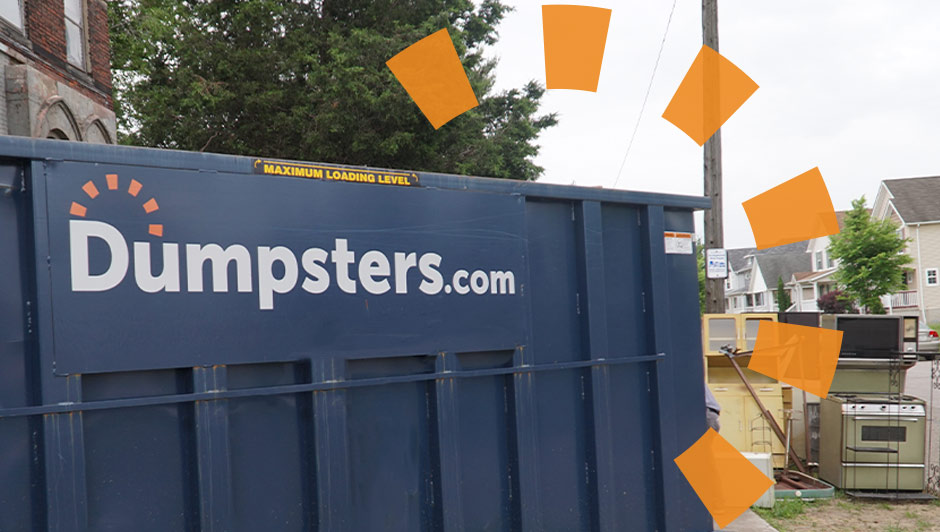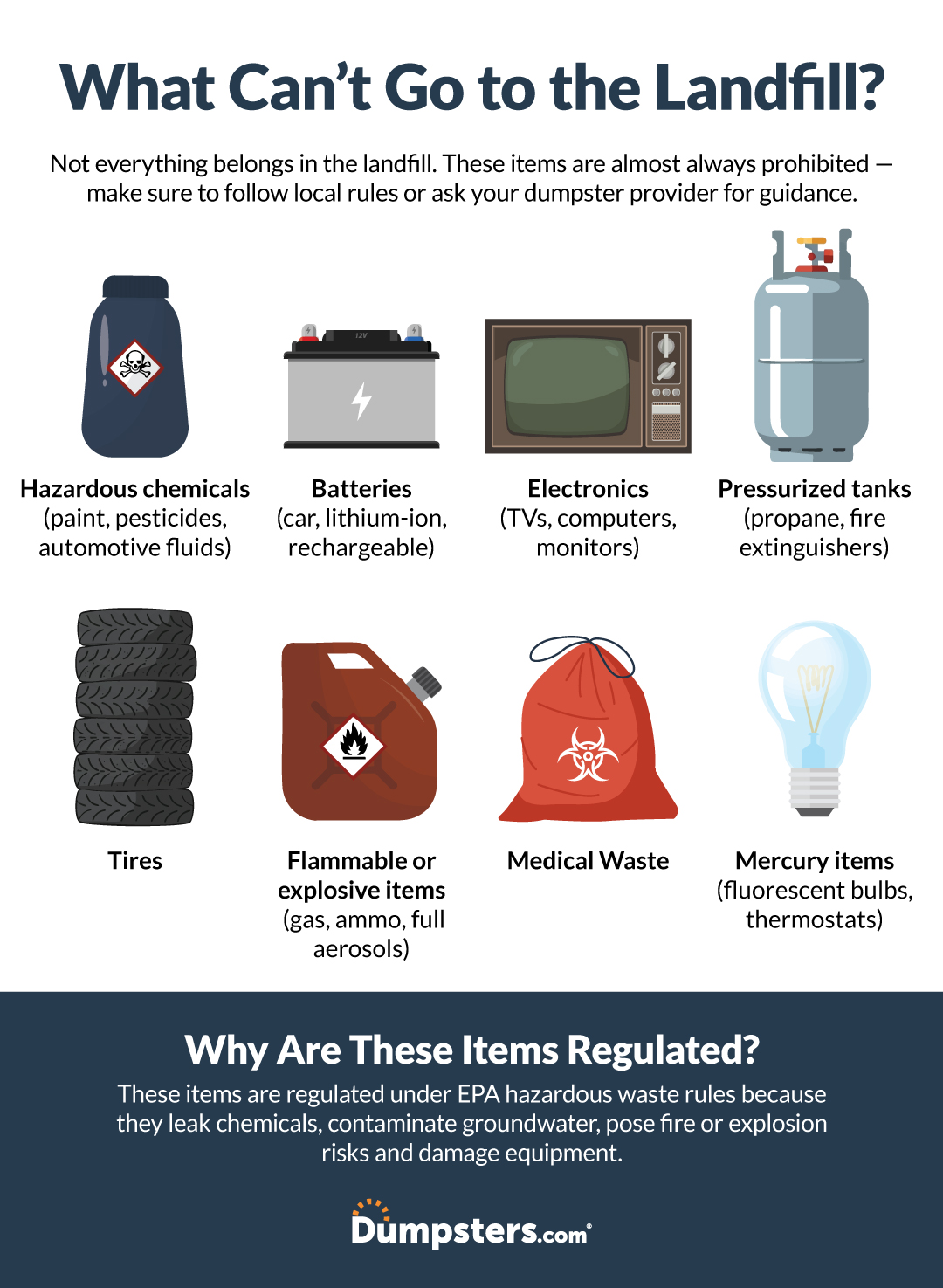What Can't You Put in a Dumpster?
Learn about prohibited, restricted and hazardous items to keep you and your roll off dumpster safe — and avoid fees.
Get exact pricing on dumpsters near you.

The Complete Guide to Prohibited Items
While you can toss most household junk and construction debris in a roll off dumpster rental, a few restrictions apply. Usually, this is because some items must be handled separately from other debris for environmental or safety reasons. It's important to learn what items are prohibited in order to avoid additional fees from the landfill and keep you and your dumpster safe.
Why Do Prohibited Items for Dumpsters Vary by Location?
Prohibited items may vary depending on your location because of local disposal laws, landfill capabilities or regional environmental concerns. Some materials can never go in a roll off dumpster due to environmental safety, such as hazardous waste. Other items, like yard debris, may be accepted in some areas but not others. Your local landfill may also have specific regulations based on their processing capabilities.
Restricted Materials
Depending on your location, some items may not be allowed in your dumpster. If you’re tossing the following materials, make sure to check with your local municipality to see if they’re allowed ahead of time.
Mattresses & Box Springs
You can only toss mattresses and box springs in some locations. If they’re allowed in your dumpster, there may be additional fees because these items require extra processing at the landfill.
Appliances
In some areas, you can throw away appliances in your roll off dumpster, but there may be an extra fee. Keep in mind that refrigerators usually can’t go in a dumpster and hot water tanks are never allowed in a bin.
Upholstered Furniture
You may be allowed to toss upholstered furniture like couches in your roll off container. Reach out to our team to confirm which pieces of furniture you can toss in your area.
Electronics
It’s best to avoid putting electronics in a dumpster because many of them contain hazardous materials. Check with your local municipality ahead of time to see if your area accepts any electronics at the landfill.
Tree Stumps
Tree stumps may be accepted in your area, but there could be size restrictions or extra processing fees per stump.
Dirt
Some areas allow you to toss dirt in a dumpster for disposal. However, if the dirt is contaminated, you cannot dispose of it in a dumpster because it will pollute the soil at the landfill.
Food waste is often prohibited from roll off dumpsters since it can attract rodents or make a mess in the container. If you have to dispose of large amounts of food waste, consider using municipal trash services or sending the waste to a local composting center.
Empty aerosol cans can go in a roll off dumpster. However, if the cans have liquid inside them or aren’t empty, they can’t go in a bin because they may explode.
Yard debris can usually go in a dumpster rental, but you may be limited in the amount of waste you can toss. Some yard waste, like tree stumps, may have an additional fee for disposal. In some areas, you can’t mix yard debris with other waste and will need a yard debris dumpster.
Event waste from neighborhood block parties or community events often includes food waste, which cannot be thrown in a dumpster in large amounts. It’s best to find a composting center that will accept your organic waste.
Prohibited Items
The following materials are never allowed in a roll off dumpster, no matter where you live. These prohibited items may cause fires, damage the landfill or dumpster, or need to be processed separately from your typical household and construction debris to ensure everyone’s safety.
Car Batteries
Car batteries, as well as lithium batteries, cannot go in a dumpster because they can leak harmful chemicals. Take old car batteries to a local recycler or auto shop.
Tires
Most landfills don't accept tires because they can trap gases and take a long time to decompose. Tires can also float to the top of the landfill, harming the landfill’s structure. Contact your local municipality, an auto parts store or tire dealership for disposal.
Railroad Ties
Materials like railroad ties and telephone poles are treated with harmful wood preservatives and aren’t allowed in our dumpsters.
Hot Water Tanks
Hot water tanks are not accepted in any dumpster because they can contain harmful gases that increase the risk of explosion. Other hot water heater disposal options include selling, scrapping or donating.
Inks & Resins
Inks and resins used in pens and printers can damage equipment and stain the interior of dumpsters. These are best disposed of through recycling centers or retailers with drop-off services.
Paint and Lacquers
Full or partially full cans of wet paint cannot go in a dumpster, including paint thinners, lacquers or wood stains. However, in most areas, you can dispose of dry latex paint as long as you wrap the sealed can in a plastic bag.
Certain Appliances and Electronics
Materials containing oils, batteries and circuitry can't go in a regular landfill due to safety concerns. Because of this, disposal facilities typically ban complex electronics and accept some appliances for a fee. If you're tossing one of the following items, you may need to find a specialized waste facility instead.
Prohibited Appliances
Most landfills don’t accept appliances that contain refrigerants, oils or electronics because they can release harmful chemicals. In some areas, you can load appliances for an additional fee, but reach out to our team before tossing these items:
- Refrigerators and freezers
- Air conditioners and dehumidifiers
- Water coolers and ice makers
- Dishwashers and washing machines with digital panels
- Microwaves
- Any appliance with a built-in rechargeable battery or display screen
Prohibited Electronics and E-Waste
Electronics include any item that contains circuitry, lithium batteries or digital components. Rechargeable products sold today almost always use lithium batteries. These parts can release hazardous materials, so they can't go in a normal landfill. Look for a dedicated e-waste facility if you're throwing away the following items:
- Computers, laptops and tablets
- TVs, monitors and gaming consoles
- Phones, stereos and DVD players
- CDs, DVDs and VHS tapes
- Smart home devices and rechargeable tools
- Office equipment like printers and copiers
- Small appliances with digital controls
- Rechargeable toothbrushes and vape pens
Adhesives, like glue or epoxy, should be disposed of with regular household trash instead of in a roll off dumpster. Loose adhesives can damage the container, and they may cause debris to stick together or to the container walls, making it hard to remove.
Fluorescent lightbulbs contain small amounts of mercury, so they can't go in a dumpster. Many landfills prohibit the disposal of these items, while other areas require them to be recycled properly. Recycling is required in California, Maine, Massachusetts, Minnesota, New Hampshire, Vermont and Washington.
Refrigerators, freezers and AC units cannot be disposed of in a dumpster unless a professional removes the Freon. Freon-containing appliances can usually be picked up by local sanitation departments as part of their bulk debris pickup schedule. Or, some retailers will take your old appliances when you purchase a replacement.
Chemical cleaners or solvents should not be tossed in a dumpster. However, you may throw empty containers in your dumpster as long as they are rinsed out and do not contain any residual chemicals.
Propane tanks, fuels, oils and other flammable materials are serious safety hazards when tossed in a dumpster. These substances are highly combustible, and it is illegal to dispose of them improperly in most areas. Contact a propane company, your local fire department or a hazardous material collection center to learn how to dispose of these items safely.
Like railroad ties, telephone poles are treated with harmful wood preservatives and can’t go in a dumpster.
Hazardous Waste
Hazardous materials are never accepted in dumpsters or landfills due to environmental regulations. If disposed of improperly, these items can release toxic fumes or leak chemicals into the soil or groundwater. Get in touch with your local municipality or solid waste agency to find a hazardous waste disposal site near you.
Flammable or Ignitable Waste
Flammable or ignitable waste starts fires easily or can quickly intensify an existing fire, so they must be thrown away properly.
Corrosive Waste
Corrosive waste is any very acidic or basic material that can cause severe harm to human skin and even erode metal containers, like dumpsters and trash cans. It can also contaminate groundwater and hurt marine life if thrown out improperly.
Biohazardous or Infectious Waste
Biohazardous waste consists of potentially infectious materials or substances, such as blood. Of special concern is sharp waste such as needles, blades, glass pipettes and other materials that can cause injury during handling.
Toxic Waste
Toxic materials can be dangerous or lethal if ingested or exposed to the skin. Some toxic waste may cause severe eye or skin irritation, respiratory troubles, and even contamination of local ecosystems or watersheds if they are not handled correctly.
Reactive Waste
Reactive waste is unstable in normal environments and may explode under regular pressure, in normal temperatures or when exposed to water. The heat of a landfill or garbage truck compressor may increase the likelihood of these compressed gases exploding or releasing toxic fumes, which can seriously burn your eyes, nose, throat and more.
FAQs About Prohibited Items
How do I know what isn’t allowed in my dumpster?
When you rent a dumpster with us, we’ll provide you with a list of prohibited items for your area in your service agreement. You can also reach out to your local municipality to find out which items aren’t allowed at your local landfill.
What happens if I toss a prohibited item?
We may not be able to pick up the dumpster until the prohibited item is removed, which will result in a failed trip fee. If you toss a prohibited, restricted or hazardous item in your dumpster that we don’t know about, you’ll receive a prohibited item fee when it is processed at the landfill. This fee covers the cost of that special processing the landfill is required to do.
How do I get rid of hazardous waste?
There are different disposal options depending on the type of hazardous waste. You may be able to find disposal instructions on the label of your hazardous item. If not, check with your local municipality to see if there are any drop-off sites in your area.
What should I do if I’m unsure about a specific item?
If you’re not sure about a specific item, get in touch with our team. We’ll go over your debris with you and provide a list of accepted and prohibited items in your area.
What's the difference between an appliance and an electronic?
It can be tricky to differentiate between an appliance and an electronic. Appliances typically perform a single household task and use gas or electricity to run. Electronics, on the other hand, contain circuit boards and batteries and are used for communication or entertainment. Rules concerning e-waste and appliances differ from location to location, so it's best to reach out to our team if you have questions about a certain item.
More Resources
Accepted Items
See a list of items you can throw in a roll off dumpster, like household junk and lumber.
Dumpster Fees
Learn about the types of dumpster fees and how to avoid getting one.
Disposal Guides
Check out how to get rid of specific types of debris, like rocks, insulation and more.

